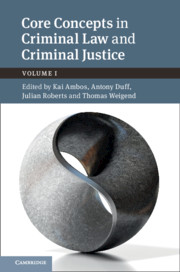Book contents
- Core Concepts in Criminal Law and Criminal Justice
- Core Concepts in Criminal Law and Criminal Justice
- Copyright page
- Contents
- Preface
- Abbreviations
- Contributors
- Part I Introduction
- Part II Criminal Law
- Part III Criminal Justice and Procedure
- 7 Proportionality of Punishment in Common Law Jurisdictions and in Germany
- 8 Criminal History Enhancements at Sentencing
- 9 Due Process
- 10 The Role of the Prosecutor
- 11 Negotiated Case Dispositions in Germany, England and the United States
- 12 Exclusion or Non-Use of Illegally Gathered Evidence in the Criminal Process: Focus on Common Law and German Approaches
- Index
- References
12 - Exclusion or Non-Use of Illegally Gathered Evidence in the Criminal Process: Focus on Common Law and German Approaches
from Part III - Criminal Justice and Procedure
Published online by Cambridge University Press: 19 December 2019
- Core Concepts in Criminal Law and Criminal Justice
- Core Concepts in Criminal Law and Criminal Justice
- Copyright page
- Contents
- Preface
- Abbreviations
- Contributors
- Part I Introduction
- Part II Criminal Law
- Part III Criminal Justice and Procedure
- 7 Proportionality of Punishment in Common Law Jurisdictions and in Germany
- 8 Criminal History Enhancements at Sentencing
- 9 Due Process
- 10 The Role of the Prosecutor
- 11 Negotiated Case Dispositions in Germany, England and the United States
- 12 Exclusion or Non-Use of Illegally Gathered Evidence in the Criminal Process: Focus on Common Law and German Approaches
- Index
- References
Summary
What consequences should state wrongdoing in the course of gathering evidence in a criminal investigation have on its admissibility in the criminal trial or usability as a foundation for the criminal judgment? Answering these questions sheds much light on the core features of criminal justice and its theoretical as well as constitutional underpinnings. In this chapter, we will compare the approach to exclusion or non-use of evidence taken in the predominantly English-speaking world of the common law with that taken in Germany. Under the common heading ‘exclusionary rules’ or ‘exclusion of evidence’ we will address both the common law perspective of excluding evidence ex ante (i.e. by declaring it inadmissible) and the German perspective of taking evidence first, but not using (‘excluding’) it for the evaluation of the merits of the case (Beweisverwertungsverbote). After laying out the theoretical framework, we focus on the development of balancing tests and the factors which may and may not be taken into account, and come to some comparative conclusions. We will, however, need to omit a discussion of specific grounds for excluding evidence as well as some other important issues: (1) whether judges and juries, who are aware of excluded evidence, actually are able to ignore this knowledge in passing judgment; (2) the extent to which exclusions actually lead to dismissals or acquittals, or whether they are mainly used by the defence to obtain a mitigated sentence.
- Type
- Chapter
- Information
- Core Concepts in Criminal Law and Criminal Justice , pp. 428 - 462Publisher: Cambridge University PressPrint publication year: 2020



